Another outstanding film festival in the can, and this time it’s the end of a first. The first virtual visit to Noir City. Readers, I have FEELINGS.
We’ve all been through (and are still going through) a lot since COVID put the kibosh on Noir City Hollywood back in March. I really needed this distraction, but now I’m trying to make sense out of a melancholy, complex tangle of feelings that’s hard to put into words.
Of course, I miss the Egyptian, and all my old friends who always sit in the same row every year. I miss Eddie and Alan and listening to all the interesting guests. And all those wonderful people out there in the dark.

We had no clue what was coming.
With Alan K. Rpde and Michael Schlesinger.
At the same time, I’ve also missed out on films (I’m still pining for all those cool Mexican flicks I didn’t get a chance to see up in San Francisco) because of living too far away, or because I had picked up a rotten cold, or because I had other unavoidable things that I couldn’t get out from under for one reason or another. And I feel for people who can’t attend in-person screenings because they have health or mobility issues, or because they work odd hours, or because they can’t get child care, or are caring for aging parents or pets who can’t be left alone. I certainly don’t want to give up seeing these great films on the big screen the way they were meant to be experienced, but I also feel like continuing to have the streaming option available in addition to the theater option (whenever that becomes possible again) would bring these movies to a much wider audience. What do you think?
Right, anyway, our final film is an unlicensed Italian version of The Postman Always Rings Twice appropriately titled OSSESSIONE (Obsession.)
I didn’t love this film the first time around, but watching Eddie’s intro and hearing how much he loves it made me want to give it a second chance. He also said that director Luchino Visconti was gay, which explains A LOT.
Anyway, here’s my original thoughts. Updated perspective at the end.
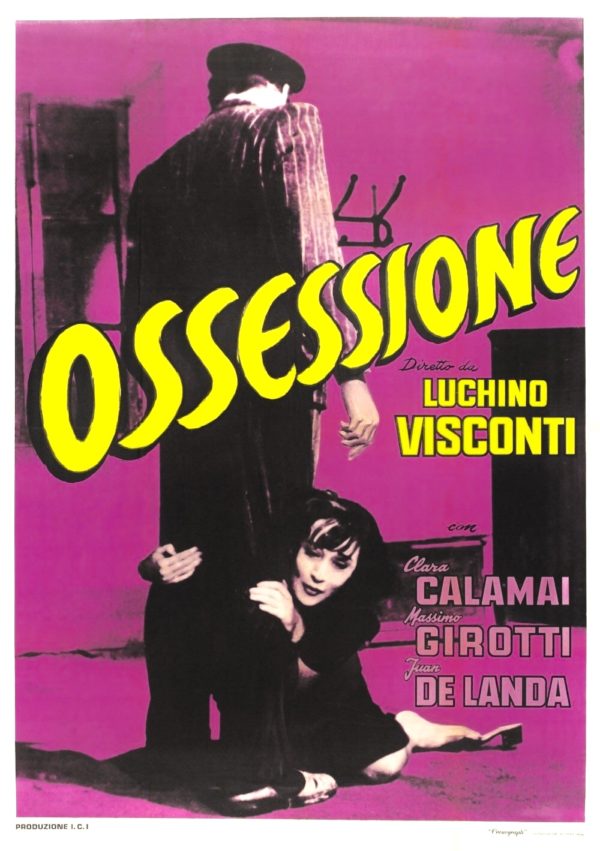
The plot is mostly the same as the familiar novel by James M. Cain, with occasional (strangely homoerotic) deviations. A strapping vagabond happens into a rural Italian cafe run by a beautiful woman and her older husband. He starts a steamy affair with the young wife and, well, you all know where this is going.

I’m not going to worry about spoilers, since I figure mostly everyone who is reading this has already read the book and/or seen the American film versions, but if for some strange reason you haven’t, now would be a good time to do so. I’ll wait.
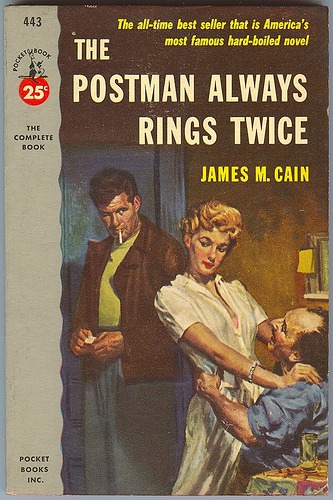
Right, so what did I think of this Italian take on the classic? Well, it seems more interesting than actually entertaining. I loved how dirty and sweaty everything was, shot exclusively in gritty, real world locations rather than fancy sets. I liked the fact that Giovanna, the wife, was the stronger, more cold-hearted partner, while Gino, the vagabond, was portrayed as more of a patsy driven by helpless love. But my biggest beef with this version, other than the fact that it was WAY too long, was the fact that two of the most crucial moments happen off screen.
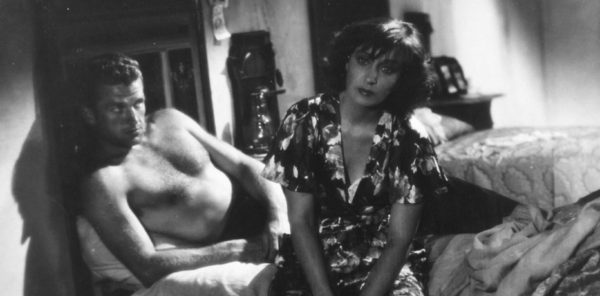
When Gino and Giovanna hook up for the first time, the director cuts away from the action so early in the seduction that you aren’t even sure they actually did it until he cuts back to them in bed, smoking in the afterglow. Which is odd, but infinitely more forgivable than the fact the the husband’s murder also takes place off screen. Again, we don’t really find out exactly what happened until it we piece it together afterwards from bits of dialog. Which makes no sense and really blunts the impact of that crucial event. Meanwhile we have to endure endless dancing and singing sequences that go on and on and a whole strange, mostly pointless side plot where Gino runs off with another man.
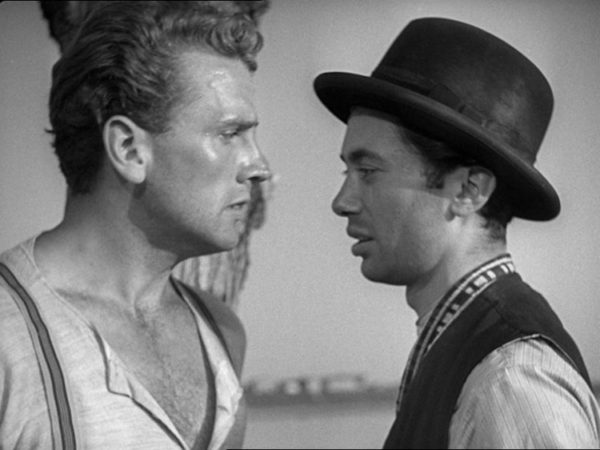
This odd, bisexual plot detour is the biggest difference between this version and the source material. When Gino and Giovanna try to leave together and she gets cold feet, he actually leaves her behind. He has no money, but a friendly (!) fellow traveller generously pays for his train ticket and the two of them end up sharing a bed and working together at a carnival. Until Giovanna shows up and lures Gino back into her murderous clutches. His gentleman friend reappears later on, begging Gino to leave the terrible situation with the now widowed Giovanna and return to the carefree vagabond lifestyle with someone who really understands him (!!!) But Gino refuses, because he just can’t break free from his dark, obsessive love.
Update: On second viewing I’m realizing this “plot detour” is actually the whole-ass point of this film. Seriously, this is the gayest movie about a heterosexual affair that’s ever been made and I am here for it.
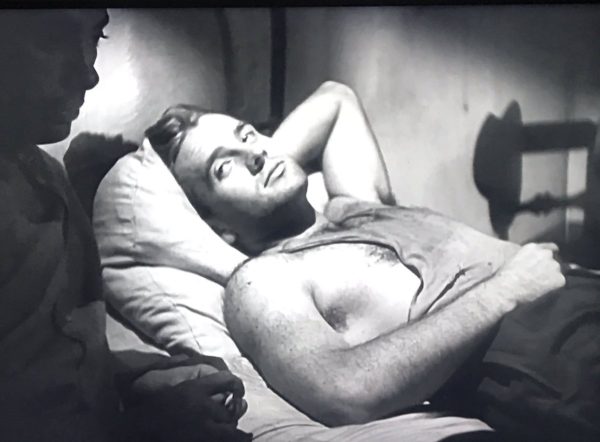
Really, the whole point of this film is to warn the viewers about the perils of heterosexuality. He had a chance to have a pure, carefree and happy life by the sea with his gentleman friend, but he couldn’t resist the sick sexual compulsion to make a baby. The ending, in which his pregnant lover is killed, is like an inversion of the usual trope where the hero gets punished for giving in to gay desire.
Clearly the biggest problem with this film, in my not-so-humble opinion, is pacing. It seems that the director was far more interested in accurately documenting the gritty, threadbare lives of working class Italians than telling a tight, well-structured story. To that end, he apparently tormented his actors during the filming. Particularly the glamorous Clara Calamai who he stripped of all make up and hair spray for the sake of raw authenticity. Which is fine, if that’s your passion and focus. In fact, this is the film that spawned the Italian Neorealism movement, and that certainly makes it interesting from a historical perspective.
But the bottom line for me is that I’m a writer. A lowbrow, pulp writer. I like stories. Lean, clever, fast-and-dirty stories that entertain first and ask questions later. So this one didn’t really do it for me. But, as a Film Noir completist, I’m sure glad I saw it.
Yeah, ok, some other quick round-two impressions.
I definitely liked it way better this time, though I don’t know if I love it quite as much as Eddie.
I stand by my original opinion that this would be a way better film if it were tighter and shorter. In retrospect, I wouldn’t cut a single second of the amazing conversation between the hero and his gentleman friend in the room with only one bed, but I still could do with less singing and dancing.
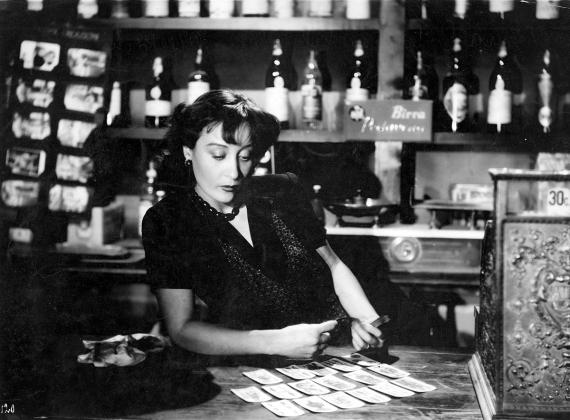
Also, I’m still baffled by the approach to hubby’s death. This film feels so slow, particularly the second half and the whole angle with the gelato girl. Which is deliberate, clearly, but then the big crucial murder scene is just rushed over like a half-assed afterthought. Is there some kind of Italian Hays Code equivalent that says you can’t show certain things? I mean, they do show the final car crash so…? I dunno but it still seemed just as inexplicable and off-putting as it did the first time around.
Tl:dr – better the second time, but I still prefer the Lana Turner version. So there!
One more thing. All these great international flicks will be available to stream until 11/29 and you can still purchase tickets here.
I don’t want to say goodbye, Faustketeers, this year less so than ever. So I’ll just say this.
See you in Noir City.